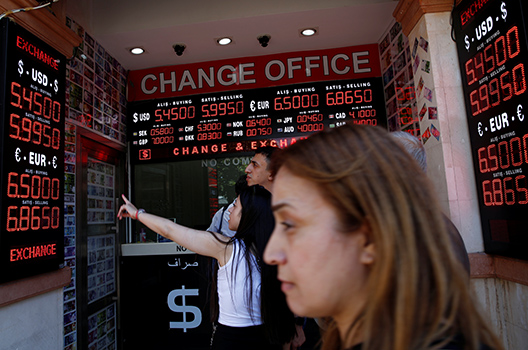On August 8, US President Donald J. Trump announced the doubling of steel and aluminum tariffs on Turkey, escalating the tension between the two NATO countries that has reached a boiling point over the last several weeks.
In his announcement, the American president said, “our relations with Turkey are not so good at this time!” The new tariffs follow the sanctioning of the Turkish interior and justice ministers on July 31.
The Turkish lira tumbled following Trump’s announcement and Turkish President Recep Tayyip Erdoğan has asked Turkish citizens to convert any US dollars and gold into lira to help the country in its “national struggle.”
What does this escalation mean for US-Turkey relations and what should Washington and Ankara do from here? Atlantic Council experts and staff provide their reaction:
Michael Greenwald, Senior Advisor to the President and CEO of the Atlantic Council and former Department of Treasury Attaché in the Middle East
“The announcement today of the tariffs on steel and aluminum in Turkey continues to further escalate a growing diplomatic crisis between Turkey and the United States. As the Turkish lira slides and economic prospects worsen, Erdoğan will need to reverse course and assure investors of Turkey’s central bank independence, while also easing tensions with Washington. It is also noteworthy to observe the Trump administration’s combination of the trade and sanctions policy playbooks, as visible earlier by the timing of the sanctions on Rusal– one of the largest aluminum producers globally- amid a broader push for aluminum tariffs.”
Defne Arslan, Atlantic Council Resident Representative & Director of the Atlantic Council IN TURKEY Program
“This was a rather sudden move on behalf of the United States government, only hours after a Turkish delegation got back from Washington D.C. It is really sad to see that the relationship between two good allies has climaxed negatively. I do believe there is still room for improvement if common sense wins. Turkey’s steel exports to the United States stood at $1.12 billion in 2017, accounting for only 13.6% of Turkey’s total steel exports. So, this new tariff will only add to the list of issues waiting to be resolved between the two countries, rather than leading to any solution.”
Richard Morningstar, Chairman of the Atlantic Council’s Global Energy Center
“The imposition of tariffs is manifestly unhelpful. Tit-for-tat escalation will only lead to further misunderstandings with unforeseeable consequences. Turkey is too important to allow for what could become a rupture of a relationship that could take years to heal. Strong rhetoric should stop. Rational actors on both sides must meet to talk through the issues and reach resolution as best possible.”
Aaron Stein, resident senior fellow at the Atlantic Council’s Rafik Hariri Center for the Middle East
“The tariffs appear to have been timed to coincide with the [Turkish Minister of Finance] Berat Albayrak’s speech [on Turkey’s new economic policy] and the inconclusive working group talks. They also appear to be geared around Turkish retaliation for the original steel and aluminum tariffs. However, the rollout is indicative of how personalized this crisis has become for Trump, following what he sees as Erdoğan’s reneging on a deal Trump helped to finalize (albeit softly).
“Trump has decided to up the pressure, at a time where the Turkish economy is under severe strain. The Turkish economy’s troubles are almost exclusively linked to economic mis-management and governing incompetence, but it seems Trump wants to use this to his advantage — at least rhetorically.”
David A. Wemer is assistant director, editorial at the Atlantic Council. Follow him on Twitter @DavidAWemer.
Image: People check currency exchange rates at a currency exchange office in Istanbul, Turkey August 10, 2018. (REUTERS/Murad Sezer)
